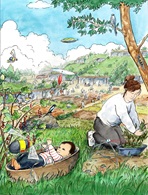 Sci Phi Journal, Spring 2025/1
Sci Phi Journal, Spring 2025/1
“The Calendar of Babel” by Richard Lau
“An Image of Worlds” by Arturo Sierra
“The War of the Satellites” by Stephen A. Roddewig
“The Mysterious Outbreak of Spontaneous Poison” by David Henson
“Letter to a Christian Nation Not Sworn to the Elder Dark” by Andy Dibble
“The Tardigate Crisis” by Matt MacBride
“Mercy INC.” by Anthony Lechner
“Just Add Salt” by Al Simmons
“The Plaque” by Bob Johnston
“Wanton” by John Leahy
Reviewed by Victoria Silverwolf
Ten new stories, mostly very brief, appear in this issue. Many contain touches of satire dealing with current cultural and political issues.
“The Calendar of Babel” by Richard Lau relates an escalating series of events that occur when the various nations of the world each decide to define their own times and dates. The philosophical point may be that the measurement of time is arbitrary, but this is mostly a wry look at international tensions reaching the level of absurdity. (There is even a sly reference to the magazine itself.)
Set at a time of common interstellar travel, “An Image of Worlds” by Arturo Sierra describes a map of the cosmos. The two-dimensional map is not detailed or accurate enough for practical use, but stirs the imaginations of those who study it.
The author effectively conveys the emotional power of maps and creates an imaginative far future setting. An image of the map accompanies the text, which may intrigue readers more than the story.
“The War of the Satellites” by Stephen A. Roddewig deals with sentient weapons at the edge of the solar system. After they have battled an unspecified enemy, their programming leads to unexpected events.
The theme of technology getting out of control is a familiar one, handled by the author in reasonable fashion. The details of the story are a little vague. The natures of the creators of the weapons, who have apparently left the solar system, and that of the destroyed enemies remain unexplained.
The title of “The Mysterious Outbreak of Spontaneous Poison” by David Henson reveals its plot. Seemingly at random, people die by eating almost any kind of food. The story features a married couple and their young child who deal with the frightening situation.
The theme might be that one must accept risks to lead a full life, since not all hazards can be avoided. Be that as it may, the premise is an intriguing one, and readers are likely to wish that more had been done with it.
“Letter to a Christian Nation Not Sworn to the Elder Dark” by Andy Dibble takes the form of a message from one of the cultists who perform hideous rites in order to prevent cosmic horrors from destroying the world. The story mixes concepts from the works of H. P. Lovecraft with references to modern issues and popular culture. The result is a tongue-in-cheek look at religious debates, complete with darkly comic footnotes. Fans of Lovecraftian fiction may find it amusing.
“The Tardigate Crisis” by Matt MacBride uses excerpts from next year’s newspapers to relate how the discovery of simple life on Mars, possibly brought there by a spacecraft from Earth, leads to increasing conflict between the United States and the Russian Federation. This grim satire of international relations may or may not be intended to suggest the current situation in eastern Europe. Regardless, it is likely to appeal to those who enjoy black comedy in the tradition of Dr. Strangelove or: How I Learned to Stop Worrying and Love the Bomb.
“Mercy INC.” by Anthony Lechner takes the form of instructions to an unspecified entity concerning ways to make a dictator show compassion. Supernatural methods such as induced dreams are discussed. Only two pages long, this tiny work seems to suggest that ordinary appeals to reason and morality have no effect on dictators. To whom it is directed remains a mystery.
“Just Add Salt” by Al Simmons features aliens that grow from seed pods and take the form of human beings. (The similarity to Invasion of the Body Snatchers is explicitly stated in the story’s first sentence.) In this case, however, the aliens are harmless. When their need for ample supplies of cadmium leads them to be confined to a desert area rich in the element, they meet an ironic fate.
This is an extended joke that depends on its punchline for its effect. Some readers may find it a bit too silly.
In “The Plaque” by Bob Johnson, aliens arrive on Earth and assault people. Their motive involves something sent from Earth long ago. Like the previous story, this is a minor bit of humor.
“Wanton” by John Leahy is narrated by a gigantic ocean wave created by a volcano. The wave destroys everything in its path. The author does a fine job telling the story from this unusual point of view, but there is little to it other than descriptions of destruction.
Victoria Silverwolf notes that the old B movie War of the Satellites has nothing to do with the story with a nearly identical title in this issue.